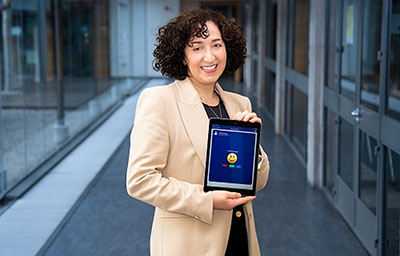Researchers have launched an app designed to interpret the emotions of non-verbal people.
Irish digital health firm seamlessCARE says the app uses artificial intelligence (AI) to interpret their emotions.
The company says the app can improve the quality of life of non-verbal people and reduce behaviours that challenge.

Dr Aviva Cohen, whose Empathic app interprets the emotions of people with learning disabilities and autism
The app can interpret up to 10 emotions. Carers record the sounds made by the non-verbal person and the AI interprets how they are feeling.
Users train the app
It says that in most families and care settings, one person understands the sounds made by a non-verbal person better than anyone else.
Therefore, the developers designed the app so that users can train it for each non-verbal person.
The users can accept, reject or edit each interpretation that the AI generates.
Behaviours reduced
The Empathic app supports people who have fewer than 20 functional words. It is also suitable for those who cannot type or use other assisted technology.
The aim is for the app to be useful for those with brain injuries, learning disabilities, stroke injuries, autism, dementia and other conditions.
Dr Aviva Cohen is the co-founder of seamlessCARE, which is based at University College Dublin.
Cohen said the inspiration for Empathic came from 14 years of caring for her late husband, Steve, who became non-verbal after a stroke.
Non-verbal people ‘technologically underserviced’
She said non-verbal people “are among the most technologically underserviced of all those with disabilities”.
Parents who have expressed an interest in the app include Carol Patterson (not her real name). She says her autistic son has been sectioned under the Mental Health Act, primarily for violent outbursts for which there was often no known trigger.
She said: “If there was a way of being warned about his outbursts before they happen, that could mean a different approach could be used, calming him down instead of restraining him, which is what is happening at present.”
Humans ‘preferred’
Disability campaigner Mark Neary’s 32-year-old son Steven is on the autism spectrum.
Neary, from Cowley, in London, said he prefers humans to interpret emotions.
He said the job of those who care for Steven is to help him better understand his emotions for himself.
In a message, Neary added: “It takes a long time, but it works and it’s so uplifting when Steven finally works something out for himself.”
Related:
- Gut bacteria linked to behaviours
- Behaviours of concern may relate to pain
- Bracelet can monitor autistics’ pain
- Autistics vulnerable to acid reflux
- Disruptive behaviour may be biological
- Gene link found to autistic behaviours
Published: 12 March 2023















